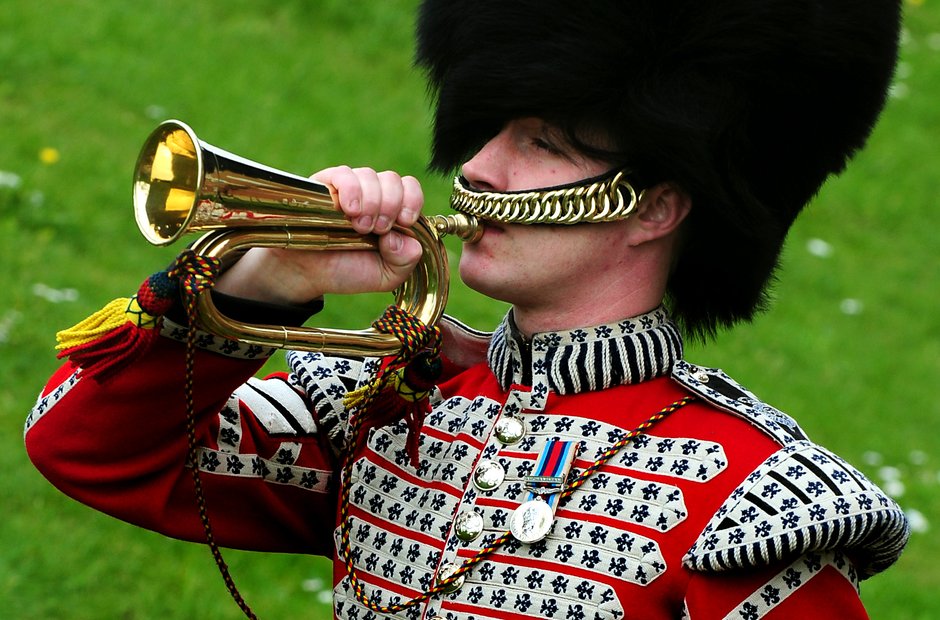Bugler Meaning goes way beyond just someone who plays a bugle. It’s about history, tradition, and the powerful symbolism of a single instrument. From ancient military ceremonies to modern-day events, the bugle’s sound has resonated across cultures, carrying messages of victory, loss, and remembrance. We’ll explore the bugler’s role, the instrument itself, and the lasting impact this figure has had on our collective consciousness.
This exploration will cover everything from the literal definition of “bugler” and its etymology to the specific techniques used to play the instrument. We’ll delve into the bugler’s historical significance in various military branches, examining specific bugle calls and their meanings. Finally, we’ll look at how the image of a bugler continues to hold cultural and symbolic weight in modern society, influencing art, literature, and even our emotional responses.
The Bugler: A Deep Dive
The bugle, a seemingly simple instrument, holds a rich history and multifaceted significance. From its origins as a military signaling device to its enduring presence in ceremonial events and popular culture, the bugle and the role of the bugler have evolved significantly over time. This exploration delves into the literal and symbolic meanings of “bugler,” examining its historical role, musical aspects, and continued relevance in modern contexts.
The Literal Meaning of “Bugler”
Source: aier.org
A bugler is a musician who plays the bugle, a brass instrument typically used for signaling and ceremonial purposes. The word “bugler” itself derives from “bugle,” which has roots in the Old French word “bugle,” referring to a type of wild ox, whose horns were likely used to create early forms of horns. The evolution of the word reflects the instrument’s development from a rudimentary horn to a more refined brass instrument.
The term “bugler” is used specifically to denote a person skilled in playing the bugle, differentiating it from broader terms like “trumpeter” or “musician.” While a trumpeter plays a trumpet, and a musician encompasses a wide range of instrumentalists, a bugler’s expertise is specifically focused on the bugle and its characteristic sounds.
The Bugler’s Role in Military and Ceremonial Settings
Buglers have played a crucial role in military units throughout history, primarily as signalers. Their calls conveyed vital information on the battlefield and served as a means of communication, coordination, and morale boosting. Specific bugle calls, such as “Reveille,” “Taps,” and “Assembly,” hold deep symbolic meaning, often associated with the beginning and end of the day, or moments of remembrance and solemn reflection.
These calls are ingrained in military traditions across different nations and branches.
| Period | Military Branch | Bungle Call Examples | Role Description |
|---|---|---|---|
| 19th Century | US Cavalry | Boots and Saddles, Assembly | Signaling troop movements, formations, and daily routines. |
| World War I | British Army | The Last Post, Reveille | Communication on the battlefield, ceremonial duties, and memorial services. |
| Post-WWII | US Marines | Taps, Retreat | Ceremonial duties, including funerals and flag ceremonies. |
| Modern Era | Various Branches | Numerous ceremonial calls | Maintaining military traditions, providing musical accompaniment for ceremonies. |
Imagine a young bugler, barely a man, standing stiffly at attention during the D-Day landings. The air is thick with the smell of salt and cordite. The roar of artillery is a constant backdrop to the nervous tremor in his hands. He raises the bugle to his lips, his breath catching in his throat, and plays “Reveille,” a defiant and hopeful sound against the chaos of war.
The sound, clear and piercing, cuts through the cacophony, a signal of the dawn and a promise of the day’s struggle.
The Bugler’s Instrument and Musical Techniques, Bugler Meaning

Source: ytimg.com
The bugle itself is a simple valveless brass instrument, typically made of brass or copper. Its conical shape produces a distinct tone, though its range and tonal capabilities are limited compared to more complex brass instruments. Buglers employ specific breathing techniques and embouchure (mouth position) to produce different notes and control the sound’s intensity and timbre. The limited range and lack of valves challenge buglers to master precise intonation and phrasing.
They often rely on subtle changes in breath pressure and embouchure to achieve the desired notes and effects.
- Maintaining consistent breath support
- Achieving precise intonation in a limited range
- Producing clear and resonant tones
- Mastering the dynamics and nuances of the bugle calls
These challenges are overcome through dedicated practice and training, focusing on breath control, embouchure, and a deep understanding of the instrument’s limitations.
Cultural and Symbolic Representations of the Bugler

Source: classicfm.com
The bugle and the bugler often symbolize themes of duty, honor, and remembrance in art, literature, and music. The image of a bugler playing a mournful call at a military funeral evokes feelings of sorrow, respect, and loss. Conversely, the sound of a bugle call signaling a victory or a new dawn inspires feelings of hope, triumph, and renewed purpose.
These associations are deeply ingrained in Western culture, particularly within military contexts. However, in other cultures, the symbolism might vary, reflecting different traditions and associations with brass instruments.
The Bugler in Modern Contexts
While the battlefield role of the bugler has diminished, their ceremonial and musical contributions persist. Buglers continue to participate in military funerals, parades, and other formal events. In civilian life, buglers might be found performing at historical reenactments, civic ceremonies, or as part of musical ensembles. Becoming a proficient bugler today requires dedicated practice, formal instruction, and a deep understanding of the bugle’s historical and cultural significance.
The training often includes mastering various bugle calls, developing precise embouchure and breathing techniques, and understanding the nuances of ceremonial performances.
Final Summary: Bugler Meaning
So, what have we learned about the Bugler Meaning? It’s far more than a simple job title; it’s a rich tapestry woven from history, music, and symbolism. From the battlefield to the concert hall, the bugler’s call echoes through time, a potent reminder of tradition, duty, and the enduring power of sound. Whether you’re a history buff, a music enthusiast, or just curious about the deeper meaning behind a simple instrument, hopefully this exploration has shed some light on the fascinating world of the bugler.
Obtain recommendations related to used golf carts for sale craigslist san antonio that can assist you today.



